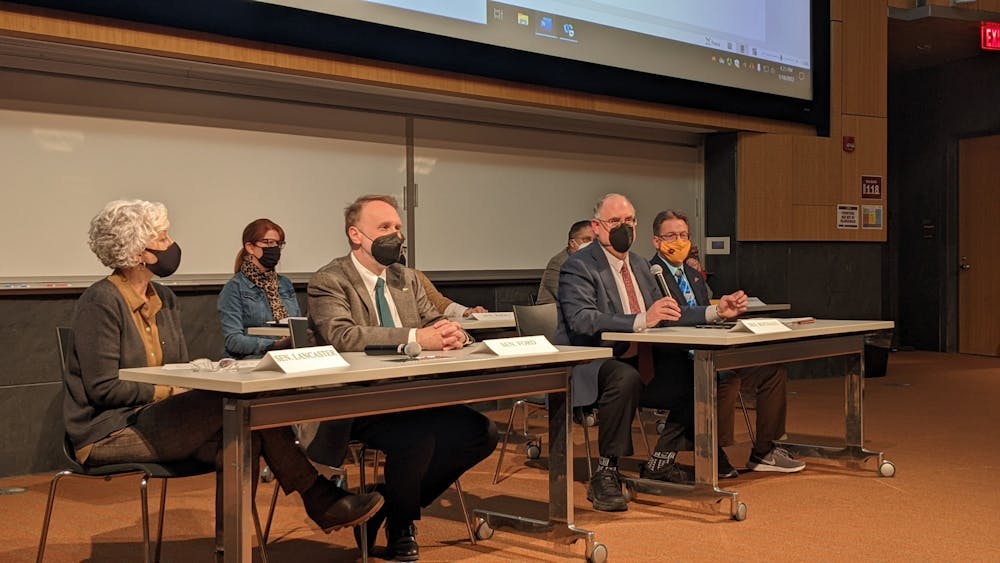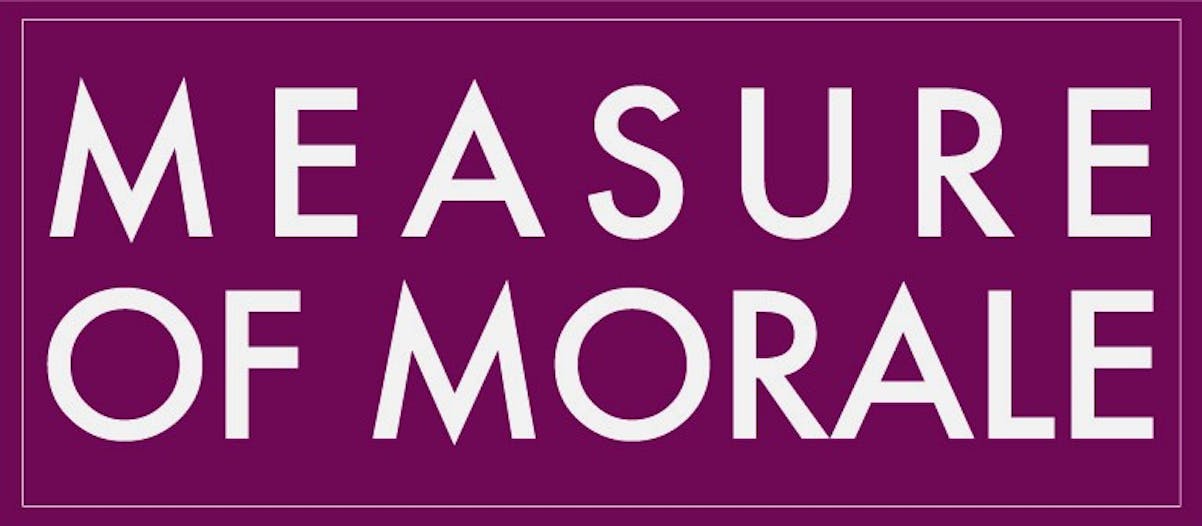Measure of Morale: Distrust grows between faculty, administration
Failed 2021 faculty satisfaction survey underscores tension between union, administrators

EDITOR'S NOTE: This story is part of a series of articles that gather the opinions of the campus community during the 2021-22 academic year. If you have an opinion to share, send it to editor@cm-life.com.

One year ago, Central Michigan University failed to successfully conduct a faculty job satisfaction survey because of a prevailing lack of trust between a faculty union and some of its administrators.
This year, university leaders are looking back at what went wrong, how to move forward and what it would take to conduct a successful survey of faculty.
In 2019, CMU received the National Science Foundation's ADVANCE Catalyst grant, to be used to identify issues with faculty gender equity in STEM fields through methods like focus groups and surveys. The university received about $295,000 for the award, which was used to pay for a variety of expenses during data collection, said Katrina Piatek-Jimenez, a mathematics professor and chair of the academic senate.
A job satisfaction survey created by Harvard University was chosen for the project because it is used by other universities for similar purposes. The survey is called the Collaborative on Academic Careers in Higher Education (COACHE).
Former Faculty Association Vice President Frim Ampaw was on the team of faculty leading the COACHE survey.
“A lot of policies and procedures look OK on the surface,” Ampaw said. "If you look at them from a different lens, they create inequity.”
COACHE cost more than $40,000 to implement and was paid for through the provost office's budget. The COACHE survey was sent to faculty in February 2021.
The survey should have made it easier to identify diversity, equity and inclusion problems on campus, Ampaw said. After months of disagreement between faculty and administrators, response rates were so low that CMU was unable to get any meaningful data.
Why the Survey Failed
CMU has not conducted a comprehensive faculty satisfaction survey in 15 years. Former Provost Mary Schutten chose to use the COACHE survey. The survey’s failure was a missed opportunity to gain a better understanding of faculty issues, Ampaw said.
"Some years ago, I was very motivated and I wanted to do all of this, but this has all been very discouraging," Ampaw said.
Frustrated with CMU for various reasons, Ampaw left the university after the Fall 2021 semester.
FA union leaders were concerned about how the survey results would be used by administrators. Educational Leadership faculty member Matt Johnson said the union’s contract with CMU contains subjects like satisfaction with family leave and health insurance.
If the university has more information about the union than the union itself, Johnson, who was FA president at the time, said it creates an unfair advantage when negotiating the union contract. When the survey launched, Johnson asked administrators for a list of survey questions so he could ensure he and his members could participate.
The union submitted a Freedom of Information Act (FOIA) request in June. The request asked CMU to provide emails connected to several issues, including COACHE.
Current FA President Amanda Garrison said the union was charged $7,628.40 for the request.
In the emails, Executive Director of Faculty Personnel Services Dennis Armistead said neither CMU nor the union could view the survey questions in advance. Johnson said he was led to believe faculty would be able to read the questions in advance. Armistead later denied that.
Armistead was contacted for a comment but has not responded as of Feb. 11.
When the survey began, Johnson sent an email to union members advising them not to take the survey. In his email, he explained that his efforts to protect faculty from having the survey results used against them had failed. Johnson later said he felt his efforts were mischaracterized - by former Vice Provost Julia Johnson - as the union being uncooperative.
Julia left CMU as of Feb. 1. Former Provost Mary Schutten left her position and accepted a faculty position Dec. 31.
The FA proposed a memorandum of understanding (MOU) to be discussed at a planned March 2021 meeting. MOUs are a common practice for other universities surveying unionized faculty, Johnson said. Protections listed in the MOU included:
- CMU would not be allowed to use the survey information to develop bargaining strategies and use them against the union.
- The union would get to see the survey questions and discard any that could affect their contract with CMU.
- CMU would not be able to use the survey results to discourage union membership.
- CMU would be required to share any survey analyses on their COACHE webpage.
According to Ampaw, the COACHE program recommends using an MOU as a solution. A provost’s report from Purdue University after its COACHE survey is one example.
“Be careful not to let faculty get caught unaware, unsuspecting or unprepared for shifts in priorities…commitments (e.g. in a memorandum of understanding) should be honored,” the report said.
Armistead asked for the MOU to be sent to his office. Johnson sent it. The March meeting was abruptly cancelled by Julia Johnson.
Emails between Armistead and Julia Johnson, identified in the FOIA request, show that administrators saw the MOU meeting as a way for the union to reopen contract bargaining. Johnson denies that was the purpose of the MOU. He said he was disappointed the FA could not reach an agreement with the university. Ampaw said the assumption from administrators was a “conspiracy theory.”
According to CMU’s COACHE report, only 212 faculty responded to the survey – out of 734 who were invited to participate.
“I know everybody on the faculty side wished it went differently,” Johnson said. “There’s none of us who are cheering it on and saying, ‘we got them; we showed them not to mess with us.’ I’ve said all along that I’ve sincerely hoped that (COACHE) would’ve gone differently.”
The survey's failure, Garrison said, was a hard blow to faculty morale.
“That was so much work that faculty put into (ADVANCE) and that survey,” Garrison said. “That was time taken from those people. They wanted to serve and to find out how to make campus better for marginalized people.
"All that time, all that energy, just to be undone.”
Problems Left Unsolved
Inequality has created “very low morale” among faculty, Ampaw said. Faculty hoped that COACHE could have helped identify problems at CMU.
“Even beyond a consensus of low morale within the faculty, it feels like there are different groups that are even more marginalized that might not be the most vocal,” Ampaw said.
Work-life balance at CMU is an issue Ampaw said she would have liked to see addressed by ADVANCE. She cited programs at Michigan State University and Oakland University as good examples of providing faculty with what they need to balance their lives and enjoy their work.
“You don’t just want faculty doing the job – you want faculty who are motivated to want to do their job,” she said.
Interim Senior Vice Provost for Academic Affairs David Patton said having something in writing, like an MOU, would have been a good solution to get FA members to participate in the survey.
“If we do (COACHE) again, we need to make sure that we have worked appropriately with the faculty unions to make sure it’s a successful survey," Patton said. "We would need to start communicating much earlier. I think the time frame was a little condensed and that always makes the conversations more difficult.”
Piatek-Jimenez, who is part of the COACHE and ADVANCE teams, said CMU plans to apply for the next grant, called Adaptation. She said focus group interviews provided good information for the team to apply for the Adaptation grant in the near future. The grant would help implement some of the ideas found during CMU's data collection.
She hopes COACHE is used again at CMU.
"It really could help the university better understand faculty experiences," Piatek-Jimenez said. "It makes us more competitive in the workforce. If we have unhappy, dissatisfied faculty and are not working to fix those issues, then faculty will leave. They will go to universities that have things in place to address such issues."



